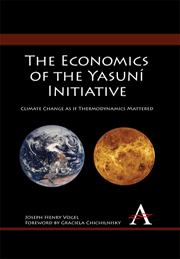Book contents
- Frontmatter
- Contents
- Prologue
- Foreword
- Introduction
- Acknowledgements
- Abbreviations and Acronyms
- The Economics of the Yasuní Initiative
- Chapter 1 Thermodynamics
- Chapter 2 The Tragedy of the Commons
- Chapter 3 The Willful Ignorance of Realpolitik
- Chapter 4 The General Theory of Second Best
- Chapter 5 Through the Bottleneck of a Cowboy Economy
- Conclusions
- Appendix: Annotated YouTube Filmography
- Ordering
- Notes
- Index
Foreword
Published online by Cambridge University Press: 05 March 2012
- Frontmatter
- Contents
- Prologue
- Foreword
- Introduction
- Acknowledgements
- Abbreviations and Acronyms
- The Economics of the Yasuní Initiative
- Chapter 1 Thermodynamics
- Chapter 2 The Tragedy of the Commons
- Chapter 3 The Willful Ignorance of Realpolitik
- Chapter 4 The General Theory of Second Best
- Chapter 5 Through the Bottleneck of a Cowboy Economy
- Conclusions
- Appendix: Annotated YouTube Filmography
- Ordering
- Notes
- Index
Summary
Humans are changing the metabolism of the planet to a degree previously unknown. We are fundamentally altering the gases in the atmosphere, the bodies of water and the complex web of species that constitutes life on Earth. The Economics of the Yasuní Initiative appears at a time when the dangers to the world's resources have become clear to the naked eye. Rates of extinction are now 1,000 times higher than the rate inferred from the fossil record. Climate change seems to be accelerating. For humans, this means rising seas, ferocious floods, prolonged droughts and erratic weather patterns. In 2010, we may see over 50 millions climate refugees worldwide. The problem is global in nature. There is nowhere to hide.
Approximately 80% of humanity lives in the developing world, often amidst valuable natural resources. Ecuador is a microcosm of that world and its UNESCO Biosphere Reserve – Yasuní – is exemplary of resources in their original state. However, Yasuní sits atop a huge oil reserve. As is the case in many other carbon-rich developing nations, roughly half of Ecuador lives in poverty. Understandably, the government is tempted to exploit the oil of Yasuní and expand the agricultural frontier simply to feed its population despite the negative global impacts on the environment – just as industrialized countries did at a similar stage of their economic development.
The conflict between basic needs and resource exports is as acute as it is cruel. In the case of Ecuador, the lion's share of export income comes from petroleum sales and the majority of its people enjoy no benefit.
- Type
- Chapter
- Information
- The Economics of the Yasuní InitiativeClimate Change as if Thermodynamics Mattered, pp. xiii - xviiiPublisher: Anthem PressPrint publication year: 2010



